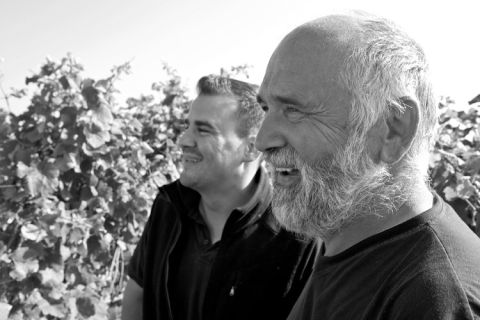From €7.50, 119 Danish kroner, £14.10, 2,596 Japanese yen, $27.99
Weingut Friedrich Becker, run by father-and-son team Friedrich and Friedrich (aka, Fritz Jr and Fritz Sr, pictured above), is known and recognised internationally for world-class Pinot Noir and the Pfalz estate is widely acknowledged as one of the finest Spätburgunder producers in Germany. But while their powerful, fierce reds demand attention and often require quite a bit of ageing to become approachable as well as deep pockets for those with the storage space and patience, they also make something far more playful that doesn't ask for anything but unpretentious enjoyment.
It's the wine they call Petit Rosé. Usually a blend of red varieties, the grapes come from vineyards in Schweigen, on both sides of the Rhine (70% of their vineyards are in Alsace). These are 10- to 50-year-old vines on rich sandstone and limestone soils. The grapes are hand-picked, and the wine is made, like most rosés, with a short maceration on skins, then gently pressed and fermented in stainless steel. It spends five months on fine lees and gets a light filtration. I had a chance to taste both the 2019 and 2020 vintages at the The WineBarn annual tasting in early May and was simply delighted by both vintages.
Slightly different from each other (but don't ask me to choose between them), both vintages are a relatively deep pink colour, and both have fabulous chew and gumption of fruit. These are no shrinking violets. Becker didn't get the global memo that all rosés must be pale, sour-dry and uninteresting. He's not afraid of a bold splash of fruit and a nubbin of residual sugar, the flavours coming in firm, vivid, strongly defined shapes like a Leon Morrocco painting. The wines have great energy, silkiness and fluid muscularity – like stocky, agile little gymnasts.
The 2019 is a blend of Dornfelder, Pinot Meunier, Portugieser and Pinot Noir, and 8.2 g/l of residual sugar is balanced by acidity at 7.8 g/l. It tastes of salt and sand, fruit leather and wild, ripe raspberries. It's savoury in frame and undertow; fruit-sweet and juicy with rounded flesh. The 2020, a blend of Pinot Meunier, Portugieser and Pinot Noir, has higher residual sugar (9.4 g/l) but again, it's perfectly, robustly balanced by the 7.7 g/l of acidity. You can taste the additional sweetness, like a beatific Buddha belly, but it comes with intense blood-orange freshness, cinnamon bark, a lick of quinoa and implicit bitterness that reminded me quite a bit of a rosé vermouth. Both wines are just 11.5% – making them perfect lunchtime, afternoon or hot-weather wines.
They're also proper food wines. Because I tasted them in London, I didn't get a chance to play with food-pairings. But I'm fairly convinced they'd go with almost anything on the table, especially big, bold flavours. Top of my list would be a soft English goat's cheese; but smoked lamb with a pomegranate and herb dressing would also be playing on my mind. Or, just for fun, bratwurst in a roll with lots of mustard and sauerkraut. They'd be my first choice for the picnic basket (the screwcap being another point in its favour).
You can get hold of it in Germany, Denmark, Japan, UK and the USA (VA). The WineBarn is the exclusive UK importer of Becker's wines and both vintages are available for £14.10 online from The WineBarn website.
For Becker's more serious wines, see the most recent reviews of the GG Spätburgunders.
The photos are kindly provided by the Friedrich Becker team, credit for the portraits goes to Jörg Wilczek.


















